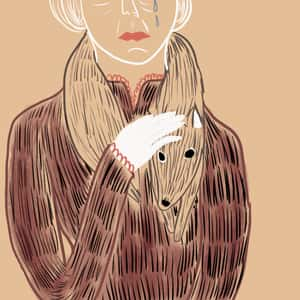 |
| William Lipincott | Loves Ambush | 1890 |
Psychology is a short story by Katherine Mansfield first published in Bliss and Other Stories (1920).
As luck would have it, I've managed to select three very different types of Mansfield stories for the #1920Club reading week.
Miss Brill was set in post-war France with a focus on loneliness and that confronting moment when we see ourselves as others see us. The Wind Blows was set in New Zealand and reflected Mansfield nostalgic phase after her brother was killed towards the end of WWI. Psychology is probably set in Europe with it's mentions of a studio apartment, a sommier, and the importance of taking tea (which could be English or NZ I grant you). It is also one of her more highly developed interior stories, with narrative shifts, mutable personalities and oodles of symbolism.
All three share the Modernist style that Mansfield was renown for. Modernism is a late nineteenth/early twentieth century movement that grew out of industralism and the rise of city living. It was also a rejection of the certainty that embodied Enlightenment thinking. It reflected the chaos and upheaval felt during WWI and it's aftermath. It was a time of innovation, experimentation and embracing everything new. Old cultural norms were considered out-dated and of no use in this brand new world. Parody, irony and revisionism were employed to critique the past. Stream of consciousness, technological advances and abstraction became the new philosophy.
It's not always easy to remember that Mansfield's modern style of writing was unusual and innovative at the time; it now seems so normal and natural.
In Psychology, she explores the idea of an individuals public, private and secret self. What should be or could be revealed, what should be suppressed or ignored and what is bubbling away underneath influencing our behaviours and actions almost against our wills?
Their secret selves whispered: “Why should we speak? Isn’t this enough?”
Her two main characters torture themselves with their unspoken sexual desires versus their desire for freedom and the maintenance of their individual selves. There is an attempt to separate the sexual from the emotional with plenty of symbolism in the form of lamps, fires and tea sets.
For the special thrilling quality of their friendship was in their complete surrender. Like two open cities in the midst of some vast plain their two minds lay open to each other. And it wasn’t as if he rode into hers like a conqueror, armed to the eyebrows and seeing nothing but a gay silken flutter — not did she enter his like a queen walking soft on petals.
They complicate matters with denial and restraint and aloofness, resulting in both of them finishing the afternoon tea feeling unsatisfied and out of sorts.
A curious bohemian ending surprises us with the arrival of the 'elderly virgin, a pathetic creature who simply idolised her (heaven knows why).' Instead of turning her away as usual, this time she embraces her and her dead bunch of violets (more symbolism). It made me wonder if this was Mansfield exploring her own complicated sexual feelings about men and women.
Especially as we then see the writer at work, critiquing the psychological novel and dashing off a quick note to the gentleman that mirrors the conversation she just had with the virgin. Quixotic and contrary to be sure!
This barely touches on the depths within this brief story. I suspect I could spend hours and write pages and pages on all the symbolism, psychological nuances and themes explored by Mansfield. But I will spare you that this time, and merely suggest that if you want to experience a quintessential Mansfield short story that gives you lots to chew over, then Psychology is the one for you.
A big thank you to Kaggsy and Simon for hosting the #1920Club.
My other Katherine Mansfield posts:
- Miss Brill (1920)
- The Wind Blows (1920)
- Psychology (1920)





